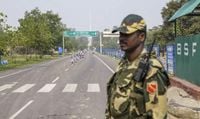The G7 Foreign Ministers on Friday called for the de-escalation of tensions between India and Pakistan and urged maximum restraint from both countries. The grouping also raised concern over the safety of civilians and condemned the dastardly terrorist attack in Pahalgam on April 22 that killed 26 civilians in Baisaran Valley. It called for the two countries to engage in direct dialogue and said it continues to monitor events closely.
"We, the G7 Foreign Ministers of Canada, France, Germany, Italy, Japan, the United Kingdom and the United States of America and the High Representative of the European Union, strongly condemn the egregious terrorist attack in Pahalgam on April 22 and urge maximum restraint from both India and Pakistan," a press release read. "Further military escalation poses a serious threat to regional stability. We are deeply concerned for the safety of civilians on both sides," it said. "We call for immediate de-escalation and encourage both countries to engage in direct dialogue towards a peaceful outcome. We continue to monitor events closely and express our support for a swift and lasting diplomatic resolution," the release added.
Singapore also raised concern about the escalating tensions between India and Pakistan and urged both parties to de-escalate. In a statement on Friday, Singapore's Ministry of Foreign Affairs (MFA) said, "Singapore is gravely concerned about the ongoing military confrontation between India and Pakistan following the heinous terror attack in Pahalgam, Jammu and Kashmir, on April 22." "We call on both parties to de-escalate tensions through diplomatic means and ensure the safety of all civilians," it said. Earlier on May 7, the Southeast Asian nation advised Singaporeans to defer all non-essential travel to Jammu and Kashmir in India, and to Pakistan. It advised its citizens in both countries to remain vigilant and take all necessary precautions for personal safety.
The Group of Seven (G7) nations on Sunday urged India and Pakistan to exercise maximum restraint and called for immediate de-escalation of their military conflict through dialogue. The call by the powerful grouping came amid the continuing escalation of the military confrontation between the two nuclear-armed neighbours. The G7 said it is continuing to monitor the situation "closely and express our support for a swift and lasting diplomatic resolution." In a statement, the foreign ministers of the G7 countries said further military escalation poses a serious threat to regional stability.
"We, the G7 foreign ministers of Canada, France, Germany, Italy, Japan, the UK and the US and the High Representative of the European Union, strongly condemn the egregious terrorist attack in Pahalgam on April 22 and urge maximum restraint from both India and Pakistan," the grouping said in a statement. "Further military escalation poses a serious threat to regional stability. We are deeply concerned for the safety of civilians on both sides," it said. "We call for immediate de-escalation and encourage both countries to engage in direct dialogue towards a peaceful outcome," the G7 said.
The G7 nations on Friday urged immediate de-escalation amid rising tensions between India and Pakistan following alleged missile strikes. In a joint statement, the bloc called on both nuclear-armed neighbors to engage in direct dialogue to prevent further conflict and ensure regional stability. "We, the G7 Foreign Ministers of Canada, France, Germany, Italy, Japan, the United Kingdom, and the United States of America, along with the High Representative of the European Union, strongly condemn the egregious terrorist attack in Pahalgam on April 22 and urge maximum restraint from both India and Pakistan," the statement read.
"Further military escalation poses a serious threat to regional stability. We are deeply concerned for the safety of civilians on both sides." The statement added: "We call for immediate de-escalation and encourage both countries to engage in direct dialogue towards a peaceful outcome. We continue to monitor events closely and express our support for a swift and lasting diplomatic resolution." Tensions between the two nuclear-armed neighbours escalated sharply after the Indian Army conducted precision strikes on May 7, codenamed ‘Operation Sindoor’, targeting terror launchpads in Pakistan and Pakistan-occupied Kashmir (PoK). The operation was launched in retaliation for the April 22 terrorist attack in Pahalgam, Jammu and Kashmir, which claimed the lives of 26 people, most of them tourists.
The G7 group of nations on Friday (May 9, 2025) called for “immediate de-escalation” and “maximum restraint” in the conflict between India and Pakistan, as tension escalates between the nuclear-armed neighbours. “Further military escalation poses a serious threat to regional stability,” the Foreign Ministers of the seven wealthy democracies said in a statement, adding that both sides should “engage in direct dialogue towards a peaceful outcome.” “We call for immediate de-escalation and encourage both countries to engage in direct dialogue towards a peaceful outcome. We continue to monitor events closely and express our support for a swift and lasting diplomatic resolution,” Canada said in a statement published by them.
The Muslim-majority Himalayan region of Kashmir is claimed in full but ruled only in part by both Hindu-majority India and Islamic Pakistan. It has been the site of wars, insurgency and diplomatic stand-offs over the decades. Pakistan said this week that New Delhi and Islamabad have had contacts at the level of their respective national security councils. The G7 also expressed strong condemnation of the recent terror violence in India, standing in solidarity with the victims of the Pahalgam attack. The attack in Pahalgam claimed 26 lives, most of them civilians, and sparked outrage across India, leading to retaliatory military action.
In recent years, India has been seen as an important partner by Western powers as a counter-balance to China's rising influence. Pakistan is a U.S. ally although its importance has diminished since Washington's 2021 withdrawal from neighboring Afghanistan. The G7 grouping's call for dialogue comes as both nations ramp up military activities along the Line of Control (LoC), with increasing fears of further escalation. The international community is closely watching the developments, urging both nations to prioritize peace and stability in the region.







